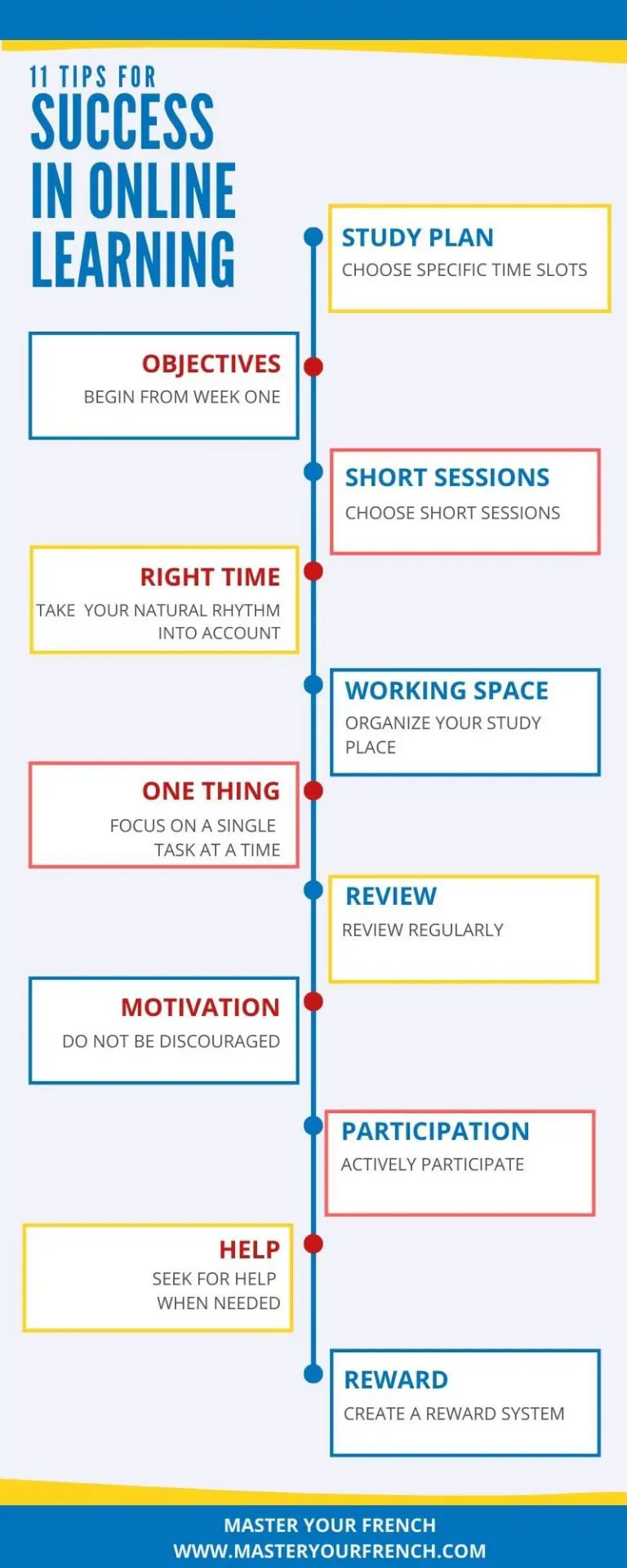11 tips and strategies to be successful in online learning
Updated: 11 June, 2023 by Mylene in Guides and Tips ▪

Online learning, or distant education, brings learning closer to knowledge-seekers. Learning online learning is currently growing in popularity.
Nowadays, many learners are looking for online education to boost their skills and widen their opportunities for employment. With the advent of technology, it’s easier than ever to:
- a new language
- take an online course
- earn a certification
This post provides you with many tips and strategies that you can adopt when learning online, on your own, whether in a French course or another program.
An overview of Distant education
With the spread of the coronavirus, institutions have opted to cancel face-to-face classes and labs and moved their courses online. There are a large number of educational technology tools developed to support distant learning. The EdTech sector encompasses technologies that are used in teaching and learning online.
Even before the global health threat of 2020, Research and Markets have forecasted that the online education market will grow to US$ 350 Billion by 2025.
During the pandemic, language apps, virtual tutoring, video conferencing tools, or online learning software have seen a surge in their usage as reported in this study.
What’s an online course?
An online course is educational content delivered via the internet. It can be viewed on a mobile, tablet, or web browser.
An online course is part of a virtual classroom that is an environment to allow students and teachers to connect, interact, and communicate. The virtual classroom is a significant player in today’s educational services.
We encourage you to consider taking our online French courses and continue to explore the many benefits that Master Your French has to offer. Happy enrolling, French learners!
When did online learning start?
Distant education is not new. Long before the internet, the first form of distance education was provided by Isaac Pitman, an English language teacher, in the 1840s via correspondence.
The modern form of online education started in the 1990s with the advent of the World Wide Web. The University of Phoenix, which is one of the first consumer online services, became one of the first to offer online education programs through the Internet.
Who are the online learners?
Many learners opt for online learning as their primary source of knowledge. Many online learners:
- Cannot attend in-person classes (because of busy schedules and work)
- Desire to acquire a new skill (e.g., learn a language, train on a new software)
- Aim to boost and transform their career
- Want to finish education (that they abandoned years earlier)
An online course allows online learners to set their own study schedules and to work at their own pace.
But, with a massive number of online courses and a world full of distractions, a growing number of online learners are looking for tips for success at learning online.
In the next section, I’ll share 11 online study tips to save time and money.
How to be successful in online learning?
The following tips will help you succeed when taking an online course:
- Make a study plan
- Set objectives
- Choose several short sessions
- Choose the right time
- Find a quiet space
- Do one thing at a time
- Review Regularly
- Do not be discouraged
- Actively participate
- Seek Help When Needed
- Reward Yourself
With these steps, you’ll be successful, and you’ll get the most when learning online.
The infographic below lists the 11 tips for success in online learning.
11 tips for success in online learning

In what follows, I’ll provide you with details that apply to each of these online learning strategies.
1. Make a study plan
Before actually starting your online learning, the best thing is to establish a work schedule.
Set up specific time slots to study in your schedule.
You have to keep in mind that your work schedule must also be flexible. Indeed, sometimes your work sessions are delayed due to the unexpected!
Flexibility is one of the main advantages, but at the same time, building a study plan is critical to online learning.
Master Your French provides online French courses. Subscribe so that you can study whenever they want!
2. Set objectives
To really organize your online learning, I also advise you to set objectives.
Begin your study as soon as you’re enrolled, and be as diligent as possible each week.
Please do not buy the course and wait to have more time later.
Many students bought an online course and if they don’t begin the first couple of days, they are more likely to never start.
One trick is to use the lesson plan to set weekly goals.
3. Choose several short sessions
Now, let’s discuss how to study.
If possible, choose several short sessions rather than long marathons (e.g., two hours rather than seven hours continuously).
Concentration has been shown to decrease over time, and a loss of efficiency is often observed when the session is prolonged without taking breaks.
4. Choose the right time
Take your natural rhythm into account when organizing your work.
Some people are very effective in the morning, while others are effective at the end of the day.
Being more willing to work will help you stay on schedule.
Make sure you put in place strategies that allow you to deal with the various constraints related to other spheres of your life (professional, family, personal).
5. Find a quiet space
Organize your study environment.
Before you begin your distance learning, determine one or more places where you can work effectively.
To properly follow your online learning, you need to set up a workspace. Find yourself a quiet, secure place that encourages work.
If you’re having trouble studying at home, consider public libraries. You can take your tablet or your PC and have access to your digital courses!
For more tips for studying at home, check this playlist on YouTube. It covers the best tips to keep you on track as you study at home.
6. Do one thing at a time
Focusing on a single task at a time is more productive.
You’ll absorb more information and have greater productivity.

7. Review Regularly
In order not to feel “overwhelmed” by your online training, I recommend that you review it regularly.
Before attacking a new lesson, review the one you just finished.
Write review sheets that include the main points of the chapter, it will play your long-term memory, and you will remember your course better.
You can also repeat the exercises in the course several times, this will allow you to check if you have understood the lesson.
The more you learn, the more satisfied you’ll feel.
8. Do not be discouraged
If you want to succeed in your distance learning, don’t be discouraged!
Your motivation may drop, this is normal.
If that’s the case, don’t hesitate to contact other students.
If your motivation is sometimes inconsistent or if you feel that it needs to be improved, here are some lines of thought in this direction.
These reflections can help you give meaning to your training and thus improve your motivation:
- First, think globally about the reasons that led you to study as well as your goals
- Ask yourself more specifically about what the course or training can bring you on a personal level. For example:
- acquire new knowledge
- learn new things
- complete other courses successfully
- refer to them in a future job
- List the advantages of working like:
- personal satisfaction
- surpassing yourself
- reduced anxiety
- Consider the advantages of taking online courses such as
- having more flexibility in scheduling and timing
- learning new ways of working
- achieving a regular
- profiting from independent work pace
9. Actively participate
Participate in discussion forums or private groups associated with the courses and engage with other students.
Joining a small group of students allows learners to communicate and to practice their skills with other learners.
10. Seek Help When Needed
The online space need not be an isolating one.
Your tutor is still there to help you, and, even if you never meet him or her in person.
Don’t hesitate to send contact to your instructor or tutor and ask questions.
If you’re looking for private French lessons with a French native tutor, you can find our offers and reserve your first session to start learning French today. Check here our private French lessons offers.
11. Reward yourself
What do you do when you are getting your goals checked off?
Creating a reward system will send positive messages to your brain.
It’s important you reward yourself in a balanced and healthy way. For instance, it could be to spend more time with your family and friends or to walk in the park or eat some chocolates.
Time to learn French
If you decided to learn French, congratulations! You’ve made the most important decision. Don’t get overwhelmed by all the resources and different ways to learn. Here are 10 steps to follow once you’ve decided to learn French.
Helping online learners and students and setting them up for success is essential to Master Your French. To discover more tips about learning, check our blog and connect with Master Your French on social media. You can follow us on Instagram @masteryourfrench, Twitter @myourfrench, and on YouTube at Master Your French.

